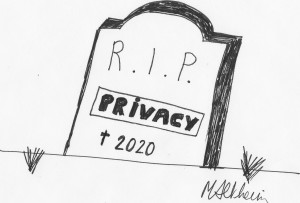The 32nd International Conference of Data Protection and Privacy Commissioners, held on october 27-29 2010 in Jerusalem, Israel, was the first event of its kind to be tweeted live.
Israel’s data protection authority, ILITA, enabled live streaming of the conference on its web site, so that even twitterers who could not attend the conference in person, were able to tweet about it in real time from all over the world.
The hashtag was #privacygenerations and all the tweets were archived at Twapperkeeper.com.
Here are some statistics :
Total tweets: 578
Total twitterers: 78
Total hashtags tweeted: 15
Total URLs tweeted: 38
Top 10 twitterers
80% (463) of the tweets in this TwapperKeeper archive were made by 25% (20) of the twitterers.
The top 10 (12%) twitterers account for 57% (334) of the tweets.
41% (33) of the twitterers only tweeted once.
@nacpec (73)
@PrivacyCamp (40)
@givoly (35)
@embedprivacy (32)
@cedric_laurant (30)
@EUdiscovery (28)
@JulesPolonetsky (25)
@HealthPrivacy (24)
@Bsegalis (24)
@InfoLawGroup (23)
Top 10 @reply recipients and/or mentions
31% (184) of the tweets in this TwapperKeeper archive were @replies or mentions.
24% (19) of the twitterers who tweeted as part of this TwapperKeeper archive received an @reply and/or mention.
Note: recipients marked ‘*’ did not tweet as part of this TwapperKeeper archive.
@zephoria (32) *
@cedric_laurant (20)
@ILITAgovil_en (17)
@JulesPolonetsky (14)
@abrandtva (13)
@givoly (11)
@EUdiscovery (9)
@oceanpark (8)
@InfoLawGroup (8)
@PrivacyCamp (8)
Top 10 “conversations”
(1) @cedric_laurant <–> @givoly (3)
(3) @IsCool <–> @oceanpark (1)
(2) @givoly <–> @JulesPolonetsky (1)
(1) @givoly <–> @oceanpark (2)
(1) @EUdiscovery <–> @privacyguru (1)
(1) @InfoLawGroup <–> @JulesPolonetsky (1)
(1) @Bsegalis <–> @JulesPolonetsky (1)
(1) @givoly <–> @ProfJonathan (1)
(1) @abrandtva <–> @EUdiscovery (1)
Note: a ‘conversation’ is an exchange of at least one @reply or mention in each direction between any two twitterers who tweeted as part of this TwapperKeeper archive.
For more details and statistics, see here.




